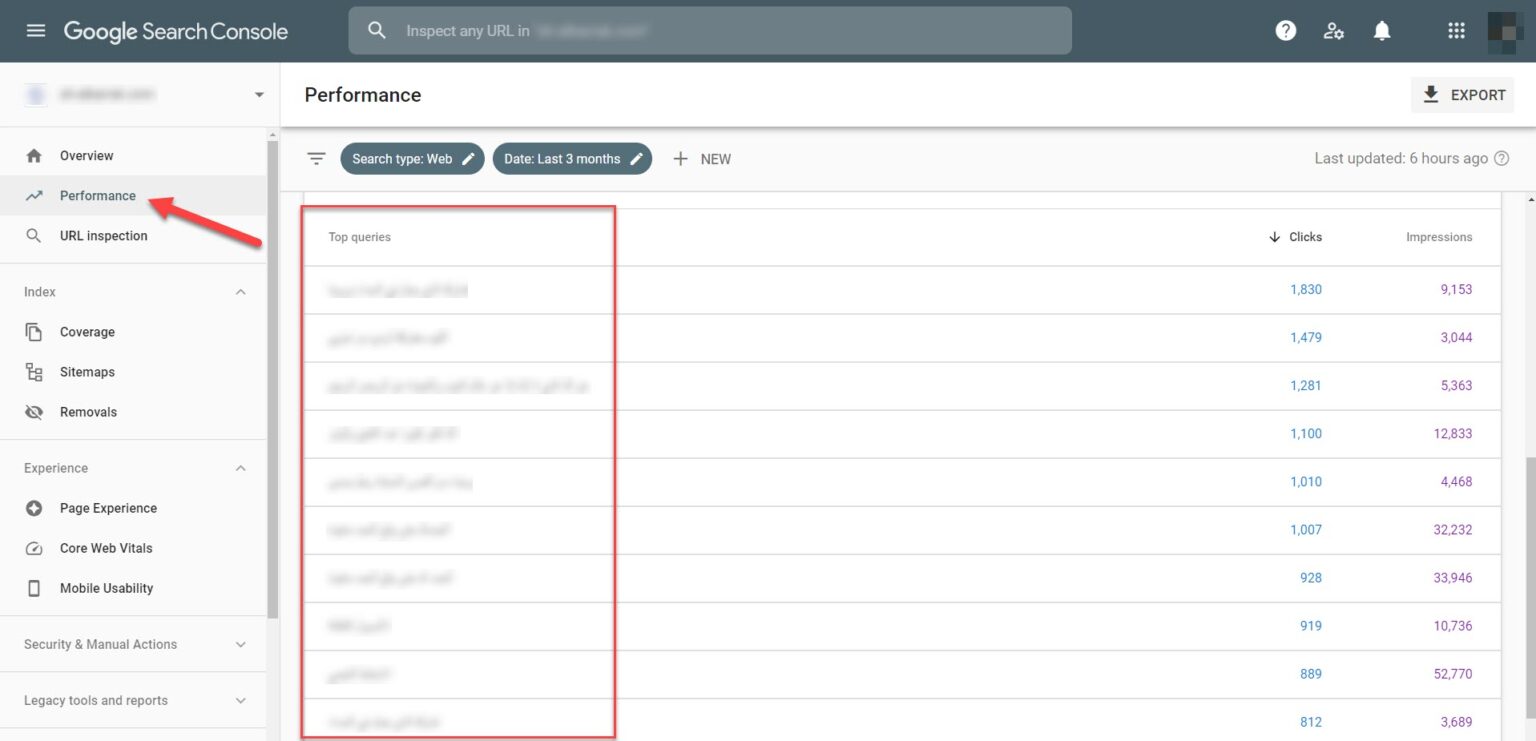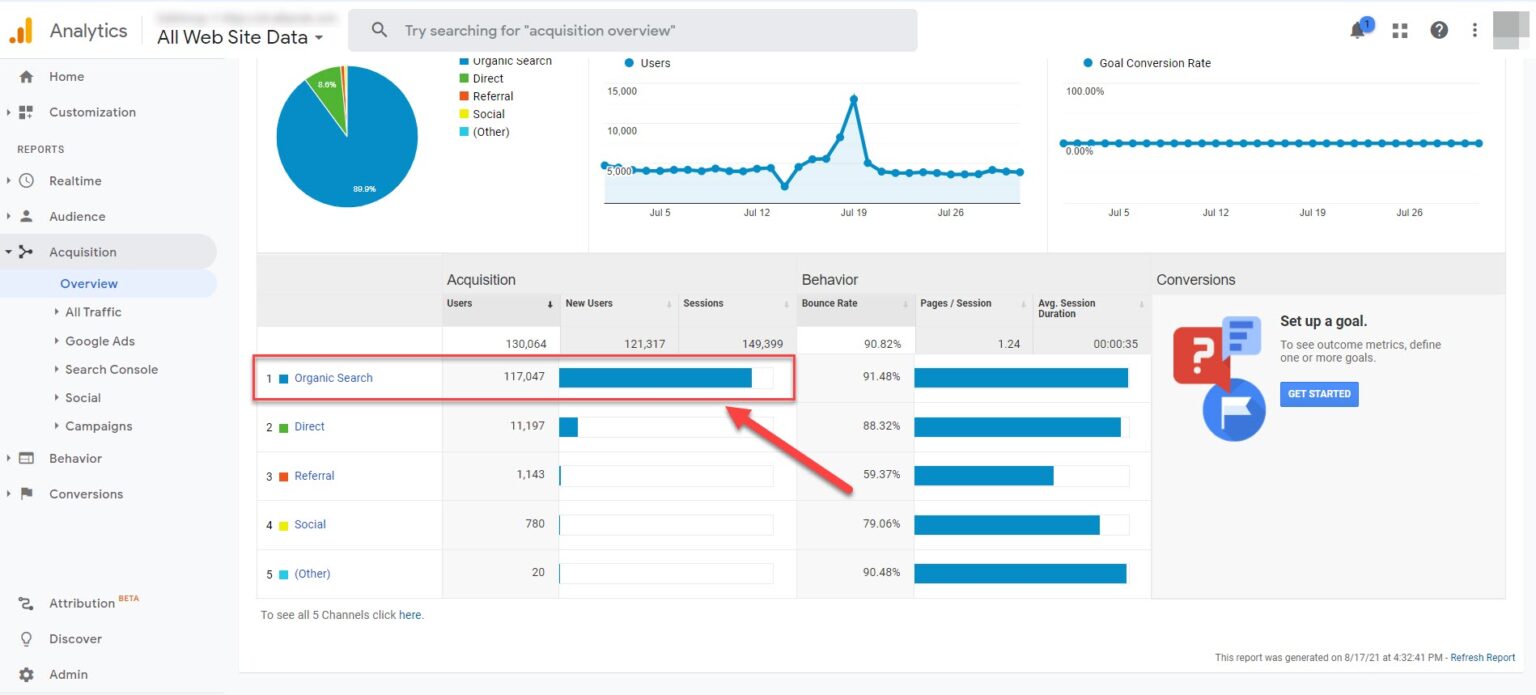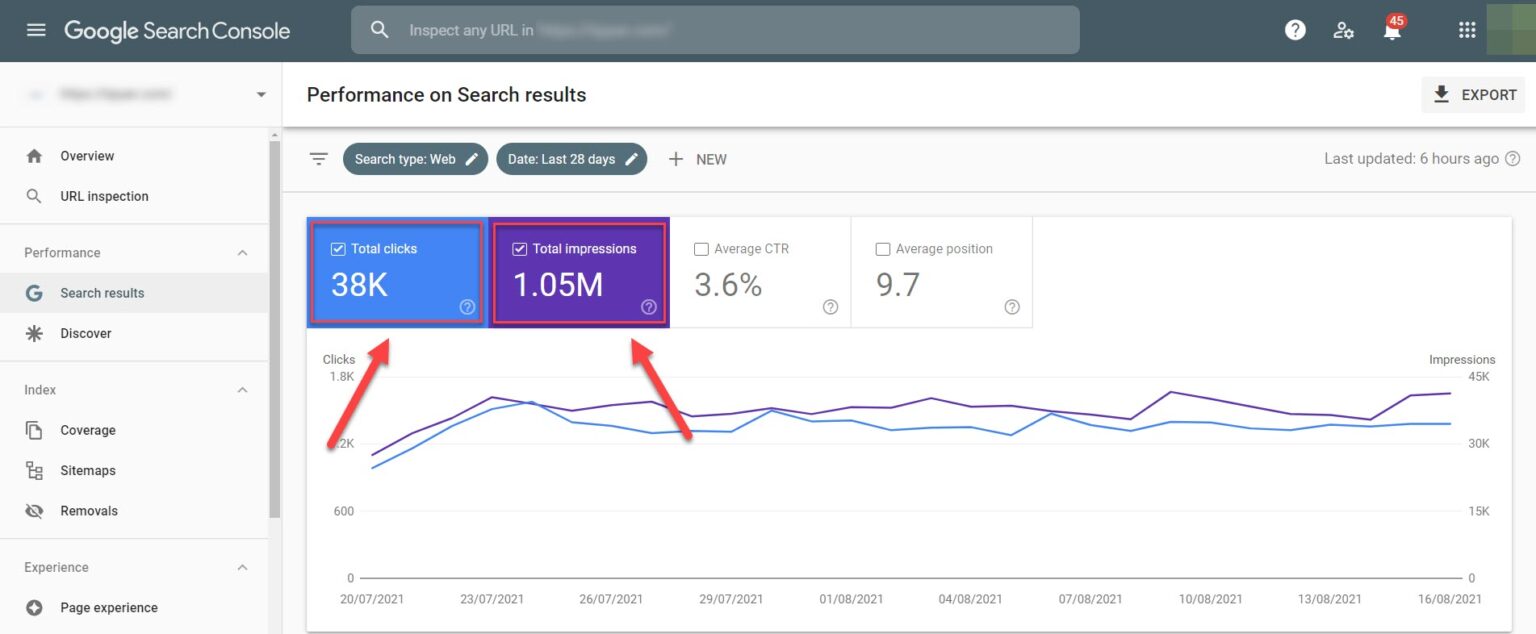When a project owner is interested in focusing their marketing efforts on a new platform from among different marketing platforms, the first question that comes to their mind is: What is the return on investment?
I will invest a huge amount of money in my digital space. Will I find a satisfactory return for that?
Will the sales volume increase from the current one?
How will my business grow?
Will I have a chance to explore more new markets?
Certainly, this is a question that is important to pop into your mind, especially when talking about SEO, as it consumes a lot of your time and effort in the beginning, and its return is not clearly measurable.
Your ultimate goal will be to include keywords related to your industry. For example, if you are an electronics merchant, your goal will be to go for keywords such as iPhone X, HP laptop, security cameras, power bank, LG screens.
Or other keywords with which you wish to expand the visibility of your website, so that when anyone writes these words in Google, your website pops up and takes them to the purchase page to complete the purchase successfully.
Whether you are the owner of an online store, or you have a website dedicated to selling one product or service and you want to beat the competition with these keywords, it takes a lot of effort from you, especially in highly competitive markets with hundreds if not thousands of websites targeting the same customers.
When we talk about SEO optimization for your website, what pops up to one’s mind is hiring an SEO expert, producing a huge amount of content, building a website structure that fits with Google’s algorithms, getting backlinks, and other popular SEO practices.
What if you put in all these efforts and then didn’t get your primary goal of being visible when these keywords are used?
Someone hired a company that specializes in SEO services and charged it a large amount of money over the course of a few months. He was surprised after a while that his website did not show up using the required keywords. He felt that the money he paid to the service provider was all for naught.
The problem that occurred was because he overlooked measuring the return on investment (ROI) for the tasks and reports that were provided to him by the service provider during work. These include, for instance, a project manager who delivered a real estate project to an engineering company and did not follow up on their work on a weekly or monthly basis, thinking that they would receive the project in its final form, an integrated and well-built structure, whatever it is.
Contrary to persistent rumors, SEO is no mysterious task that some people do with some secrets that no one else knows, and… voila! Overnight your website is on top of all search results. Even this type of practice is called “Black Hat SEO” and your website gets banned after a while.
It is true that SEO or let’s call it (Search Engine Marketing) is just like other digital marketing operations that require you to measure performance and results for the tasks you perform on a monthly, weekly and even daily basis. This is what we will learn about in this article in detail.
Promising Opportunities in Optimizing Your Website for Search Engines
When we talk about the rise of your website in search engines, you can imagine the number of promising opportunities that you are given by this achievement.
Here, for example, is an analysis of the volume of visits to the Saudi Amazon website using the aHrefs tool, which shows that it gets 1.7M visits from the search engine almost monthly, as well as 294k keywords that appear for it in the search results.

Having your website promoted in such a way is different from other promotion methods (paid advertising) in several ways such as:
- The visitor is the one who searches for your product and you are not the one who pursues them through paid ads
- A huge amount of potential sales hit your website through visitors who come organically to your website.
- You don’t pay daily for an advertising platform (PPC Network).
- The investment is long-term; your website may stay ahead of the competition using your target words for years without extra effort.
We are not just talking here about the importance of SEO for e-store owners, but rather about search engine optimization (SEO) in its comprehensive sense for different website owners including business websites, educational websites, subscription websites, employment websites or even blogs. Every website owner has a goal that they want to reach in the end via the digital world. And search engines undoubtedly help them reach this goal.
Search engines also help you with other stuff such as:
- Reaching out to a large number of users of the digital world. Google is the most visited website in the world and accounts for 92% of searches, through which billions of searches are performed on a daily basis.
- Gaining Visitor Trust: Search engine users always have confidence in the websites that appear to them in the search results, as well as the confidence to make many decisions based on the search results that appear to them.
- Better experience for your website: Basically, search engine algorithms are based on the user experience of your website more than any other factor. So, applying SEO best practices benefits your visitors in the first place. For example, you can learn about Google’s core updates and see how visitor experience is of paramount importance.
NOTE: There are other marketing benefits for your business that give more weight to your brand with your target audience.
Get to Know Google’s Algorithm Correctly
It may be taken for granted by you to follow the right practices for SEO, but the problem arises when a website admin wrongly handles SEO practices and then thinks that the search engine needs them to waste their money on complex, unmeasurable processes.
For example, some people pay hundreds of dollars to companies that specialize in selling backlinks, or build a private blog network, thinking that this is the only factor in being ranked first in search results.
We shouldn’t lose sight of the importance of the influence of brand reputation in various ways on the website’s progress in search results. But this does not mean focusing only on one of more than 200 factors of SEO.
Of course, backlinks are among the powerful factors, but through experiments, it does not constitute more than 10% of the impact on the ranking of your site, and you can use some of the famous SEO analysis tools to analyze some of the advanced websites using specific words and you will find out that some of them do not contain any backlinks.
This is just one of many common misconceptions, especially among SEO service providers. There are also some people who produce thousands of low-quality articles, thinking they have a greater chance of dominating search results with this huge number of poor articles.
If you know the search engine’s algorithm correctly, and how it understands visitors’ intention first through Rank Brain, and then searches all the websites available to it in its database to show the appropriate website that matches the intention of researchers, this gives you an idea of an appropriate plan and then you can measure the yield from the product of this plan.
Turn big plans into small, measurable tasks
Now, let’s talk practically about steps you can follow to be able to measure the return on investment (ROI) of your SEO efforts.
We’ll start with you as a business owner who needs to meet some milestones related to sales growth, brand value, marketing reputation, or whatever your goal is.
With this goal in mind, you’ve created your own website, added relevant content that expresses what you’re offering to users, and took into account the best practices in designing your website’s interface and improving your user experience. Then, you targeted your main website visibility in search results or created a blog attached to the website to show some informational articles in the search engine.
Then, you analyze the target keywords that you want your website to appear in response to users’ searches . You developed your SEO improvement plan based on some programming enhancement , the online content publishing guidelines and finally the off-page SEO to make sure the website is search engine friendly
Thus, creating a proper action plan for each of these tasks will help you measure their performance and success, leading you to the next task, and finally to the main goal of your business (for example, boosting sales).
This is a general concept, but let’s dig a little deeper.
Determining the ultimate goal of an SEO campaign
Like we said, you have an end goal for your business for which you have created your own website in the hope that it will help you reach that goal. At this point, we will try to define the expected goal of your own website in more detail.
For example:
– Increasing sales of your online store
– Promoting your brand
– Expanding into more digital markets
– Showing your website as an industry leader
– Gaining customer trust in the products offered
– Building long-term relationships with stakeholders
In fact, SEO campaigns will not help you achieve these goals in a clear, tangible and measurable way as in the case of PPC ads in terms of determining the exact cost and the return on investment against these costs. But as we said, SEO is a long-term investment whose results are seen after a while.
In general, businesses that target sales to companies rather than individuals (B2B Businesses) build a relationship with potential customers in the long term. I assure you that SEO helps you with this plan.
After setting that goal, you can build a SEO plan that will help you reach that goal or other goals. Based on these goals, you can develop a more accurate SEO plan, as well as target keywords correctly, and set the expected cost of this project.
You may proceed from these goals to:
– Building a plan aimed at creating a network of websites targeting different segments of customers
– Focusing on sales keywords and excluding informational one or vice versa
– Building content with specific specifications that attracts certain customer segments and excludes others
For example, if you are the owner of an educational platform, you will target people who wish to enroll in distance learning courses, and exclude people who seek free courses or fully funded scholarships.
You may offer free content at some points, but your main goal will be to attract customers who are oriented with online purchasing.
After defining these goals with the business team, you will have the clearest idea of the SEO plan and goals which will include:
– Target keywords
– User experience design for your website
– The size and type of content you will provide to users
– The Buyer Journey
– Follow up on the most important trends in your market
– Methods used to configure your website to match Google algorithms
– Appointing a specialist or several individuals to implement the required plan
– Building the website structure correctly
– Link all pages of the website internally (Internal links)
– Coordination between the SEO team and the rest of the teams
– Obtaining an off-page SEO
– Other goals, within the SEO plan, benefiting your business.
When you define these goals more precisely, you will break them down in the next stage into small tasks, entrust each task to a specialist who will perform it, and most importantly you will know that measuring the performance of these tasks means measuring the performance of your primary goal of SEO, which will be reflected on the goals of your business. This way you can measure the return on investment (ROI) of your SEO activities.
These goals may differ from one website to the other, but we will address some common goals and tasks that you can measure their performance in a practical way as follows:
Improving website ranking through keywords search results
One of the most important criteria by which you can measure the return on investment of your efforts via a search engine is to track the progress of the targeted keywords of your website, especially those of high importance to you.
For example, if you own a company that provides web development services, a string of words such as (creating a website), will be one of the most important keywords that you need to track continuously and you may aim to appear using this word on more than one page or even more than one website.
Depending on your SEO action plan, you can use some tools to track your website’s progress based on the targeted keywords; starting from the time they don’t appear in search results, up to the time when they show up in the first 100 results, then the first 50 results, and up until they hit the first page, and eventually pop up in the first 3 search results.
Your ultimate goal will be to appear in the first 3 search results, but never underestimate your progress before this phase and don’t feel that these previous advances were wasted achievements. These often take a long time, especially in highly competitive words. So, try to monitor this progress with patience.
The number of keywords that appear on your website
The search engine tries to understand the search terms used by visitors more accurately. Therefore, it does not show only your website based on the keywords that you target, but on other words that you did not include in the business plan and even on new search terms entered by users in search engines.
For example, when you go to Website Admin aster Tools and select the “Performance” tab, it gives you the top queries for your website’s pages. You will find that many of these terms were not originally targeted by your website.

There are also some other external analytics tools – such as aHrefs and Semrush – that tell you exactly how many keywords based on which your pages appear.
You can monitor the increase in the number of keywords based on which your website ranks. This is one of the tangible results that help you measure the performance of your website with search engines; it means that the search engine has become more understanding of the content of your website and gives it more opportunities to advance in the search results.
Number of visits generated from search engine traffic
One of the most important indicators through which you seek a return on investment in SEO, though this may not be one of the clearest goals at all, is the number of visits you receive through the search engine. This payoff is clear to you and measurable, as you can easily see the number of visits you got through Google analytics within a certain period and compare it to that of the previous period.

Bearing in mind that these numbers will not be large at first, do not count on getting a huge number of visits, for example, in the first two months. But as long as these numbers increase, you are on the right path and you are sure to reach your targeted marketing goals.
Number of impressions and number of clicks
Getting more traffic from your search engine might be your ultimate goal, but there are also milestones along the way, such as impressions and clicks, which are also some of the major stats that website analytics tools show to you.

You’ll also find Click Through Rate( CTR) (number of clicks divided by number of views): the more visitors click your pages in search results, the better. One of your goals will be to improve this percentage, especially for pages that are of interest to you.
Reducing bounce rate
Bounce rate is the percentage of the total number of sessions in which users only viewed one page. So, increasing this percentage in your analytics reports means that more visitors visit one page and then leave your website.
There is no perfect number for bounce rate; for example, blogs are different from news websites and commercial websites. However, one of your goals will be to reduce the bounce rate to ensure that visitors interact well with your website.
One priority at this stage will also be to increase the visitor session time, boost the number of pages that visitors browse in one session, and also increase the number of repeat visitors.
Number of referrals from external websites
Referrals from external websites, especially from trusted ones, is one of the criteria that influence the improvement of search results. This not only s benefits your website in terms of SEO, but also helps it gain more trust and popularity among users.
You can improve the number of external referrals by communicating directly with trusted websites and asking them to talk about you so you can publish press releases, interviews, or guest posts about you.
Or you can increase these referrals by providing quality content that is highly viral, and other websites shall refer to you with no intervention from your side.
In addition, you can measure the number of referring websites in general (referring domains) or measure the number of backlinks you get for certain pages, all while focusing more on the quality of websites that refer you than their numbers.
Number of conversions on your site
The number of conversions is any desired action that the user takes in your website, such as completing a purchase, registering, signing up, making a call, filling out a form or any other sort of conversion you request from users.
Perhaps this goal is not affected by SEO alone, but it undoubtedly helps in increasing the number of conversions. Therefore, you can measure ROI by monitoring the number of conversions of pages ranking high in the search results, or pages that visitors access through the search engine indirectly (through their journey in your website).
Monitoring the number of visitors from the target country
If your website targets visitors from specific countries or even a specific city (local SEO), in case you are the owner of a clothing store or restaurant or any service that targets visitors of a specific region, city or town, you can measure the number of visitors to your website from the target countries through the search engine.
Improving your website’s rank with Google
As we said, there are several factors to rank your website in Google; some of which relate to your website’s domain name and others to its pages, some internally and some externally, and there are special criteria. The importance of these criteria fluctuates according to their significance to Google. But, in general, you can create a checklist with all the factors and take into account what can be optimized according to the available resources.
The above mentioned insights intend to guide you through measuring the return on investment (ROI) for your search engine marketing efforts (SEO), and each of these factors benefits your business in one way or another.
Focus on all of these indicators is not a prerogative. They do differ from one business to another, as well as from one business model to another. But the important thing is to have a better idea now of how you can correctly calculate the SEO ROI.
You will first develop an SEO plan and then allocate a specific budget during a certain period to implement that plan. Then you’ll set performance indicators to reach those goals (KPIs), and at the end of the plan, you can easily see the return you have reaped from your own business.
Conclusion
Invest in your website, not in search engines
In the end, whether you are the owner of a business, organization or non-profit activity, you have some purposes for which you broke into the digital world. And you’ve come to realize the importance of investing in the various sources of promoting your website. So, you always need to care about investing in your website more than in a search engine.
Do not treat the search engine as a deaf machine to which you write some code to give your website priority in the results, or circumvent some algorithms to have priority appearing.
Rather, remember that Google is a commercial company which aims to gain the visitors’ confidence in relying on its search engine. This will only happen if it provides them with the best results they are looking for. If you are the best results visitors are looking for, your website will undoubtedly be among those results.
There are some websites that did not have an SEO expert and ignored several technical stuff that Google recommends to facilitate the archiving process. Yet, they have gone a long way towards advancing in search results.
The best return on investment you get is improving visitor experience, increasing conversions, getting visitors to interact with your website, encouraging them to repeat sessions, navigating between pages and coming back, and gaining confidence in what you offer them. Take care of these elements, as these are the best investment you can make in your own website.



